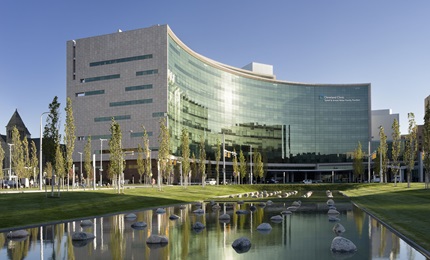Paul Ford, PhD
Insurance
Is Cleveland Clinic Part of Your Insurance?
Review a list of accepted insurance plans for our Northeast Ohio locations or learn more about purchasing a contracted managed care plan.
View All PlansAbout Paul Ford, PhD
Paul J. Ford, PhD is currently the Director of the NeuroEthics Program, which conducts cutting-edge scholarly and empirical neuroethics research and develops and promulgates best ethical practices in the diagnosis and treatment of neurological diseases.
Dr. Ford joined the professional staff in the Department of Bioethics at Cleveland Clinic in the spring of 2001. He received a B.A. in Computer Science and Humanities and a B.S. in Mathematics from Walla Walla University in 1995. Subsequently, he received a Ph.D. in Philosophy from Vanderbilt University while participating in a two year transplantation ethics fellowship at Vanderbilt University Medical Center. Dr. Ford currently holds an appointment of Associate Professor at the Cleveland Clinic Lerner College of Medicine at Case. He actively teaches medical students, residents, and fellows, and was awarded a year long Educational Fellowship from the Cleveland Clinic Division of Education in 2009. He has been active in ethics consultation since arriving at Cleveland Clinic and has performed approximately 2, 500 ethics consultation cases primarily using an individual consultant model.
Dr. Ford's primary research interests focus on ethical issues raised by neurosurgical interventions. He works closely with the Deep Brain Stimulator Team and the Epilepsy Surgery Team. He has co-edited two books and is the author of more than seventy publications. These include authorship in journal articles that have appeared in Science, The Hastings Center Report, Neurology, Neuromodulation, and Journal of Medical Ethics as well as book chapters, and invited editorials (see CV for full list here). In terms of professional service, he has presented to the Board on Health Sciences Policy at the Institute of Medicine, served on editorial boards as a peer-reviewer, and has been an organizer of international conferences. He lectures nationally and internationally on a range of issues that include neuro-ethics, clinical ethics consultation, transplantation ethics, and engineering-computer ethics.
Education & Professional Highlights
Appointed
2001
Education & Fellowships
Medical Education - Vanderbilt University
Philosophy
Nashville,
TN
2000
Graduate School - Vanderbilt University
Philosophy
Nashville,
TN
1999
Undergraduate - Walla Walla College
Computer Science
College Place,
WA
1995
Specialty Interests
Bioethics, Clinical Ethics Consultation, NeuroEthics, Education
Research & Publications
See publications for Paul Ford, PhD.
(Disclaimer: This search is powered by PubMed, a service of the U.S. National Library of Medicine. PubMed is a third-party website with no affiliation with Cleveland Clinic.)
Industry Relationships
Cleveland Clinic physicians and scientists may collaborate with the pharmaceutical or medical device industries to help develop medical breakthroughs or provide medical expertise or education. Cleveland Clinic strives to make scientific advances that will benefit patient care and support outside relationships that promise public benefit. In order for the discoveries of Cleveland Clinic physicians' and scientists' laboratories and investigations to benefit the public, these discoveries must be commercialized in partnership with industry. As experts in their fields, Cleveland Clinic physicians and scientists are often sought after by industry to consult, provide expertise and education.
To assure professional and commercial integrity in such matters, Cleveland Clinic maintains a program that reviews these collaborations and, when appropriate, puts measures in place to minimize bias that may result from ties to industry. Cleveland Clinic publicly discloses the names of companies when (i) its physicians/scientists receive $5,000 or more per year (or, in rare cases, equity or stock options) for speaking and consulting, (ii) its physicians/scientists serve as a fiduciary, (iii) its physicians/scientists receive or have the right to receive royalties or (iv) its physicians/ scientists hold any equity interest for the physician's/scientist's role as inventor, discoverer, developer, founder or consultant.* In publicly disclosing this information, Cleveland Clinic tries to provide information as accurately as possible about its physicians' and scientists' connections with industry.
As of 2/10/2025, Dr. Ford has reported no financial relationship with industry that is applicable to this listing. In general, patients should feel free to contact their doctor about any of the relationships and how the relationships are overseen by Cleveland Clinic. To learn more about Cleveland Clinic's policies on collaborations with industry and innovation management, go to our Integrity in Innovation page.
Public Health Service-Reportable Financial Conflicts of Interest. Cleveland Clinic scientists and physicians engage in basic, translational and clinical research activities, working to solve health problems, enhance patient care and improve quality of life for patients. Interactions with industry are essential to bringing the researchers' discoveries to the public, but can present the potential for conflicts of interest related to their research activities. Click here to view a listing of instances where Cleveland Clinic has identified a Public Health Service (PHS)-Reportable Financial Conflict of Interest and has put measures in place to ensure that, to the extent possible, the design, conduct and reporting of the research is free from bias.
* Cleveland Clinic physicians and scientists subscribe to the guidance presented in the PhRMA Code on Interactions with Healthcare Professionals and the AdvaMed Code of Ethics on Interactions with Health Care Professionals. As such, gifts of substantial value are generally prohibited.
